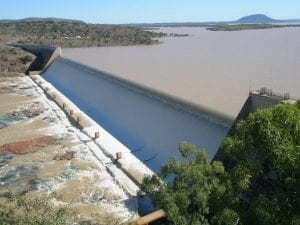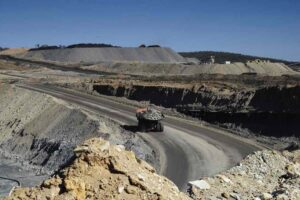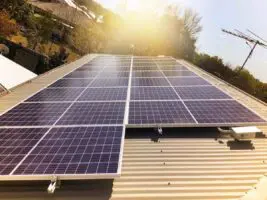Late last year we asked ACT energy minister Simon Corbell why the politics around renewables – at federal and state levels – had been tainted so badly in Australia.
“Fear and ignorance,” he replied.
Driven by whom or what, we asked.
“Driven by vested interests who don’t want to change the energy system operates,” Corbell said.
“Vested interests who are not interested in facilitating or being part of the shift to renewables, in terms of some generation interests, some network and distribution interests.
“(And) aided and abetted by politicians who are not prepared to imagine the different future. We need more people to imagine and demonstrate that a different future is possible and it is affordable.”
But is any politician from the mainstream parties on the federal stage prepared to do just that, and imagine the future without fear or favour from vested interests? And stand up and respond to the nonsense about renewables peddled by Tony Abbott, his chief business advisor, Queensland Premier Campbell Newman, and the anti-renewable rump of the conservatives? The sad answer is no.
As federal parliament resumes today, the clean energy industry is facing a critical period. Final submissions to the Energy White Paper are due, and the first report will be prepared for May.
The terms of reference for a new review of the renewable energy target will be released shortly, and will almost certainly be managed by a panel managed from within the Prime Minister’s office.
Australia is poised to become the first economy to row backwards on its renewable energy targets, just as it proposes to be the first to drop a carbon price. And no politician – with the exception of the Greens – is prepared to be outraged by the proposal.
It seems a fait accompli that the RET will be diluted, the only question is by how much, and how initiatives such as rooftop solar will be affected. We now have the extraordinary spectacle of nearly every fossil fuel generator, retailer, and network operator – along with their government owners – calling for the RET to be nobbled or even removed – despite the obvious fallout, legal action, and rising costs such actions would create.
The Coalition government has folded in the face of right wing ideologues. Labor ostensibly supports the policy that it put in place, but when it had the opportunity to defuse the politics and the uncertainty around it by adopting the Climate Change Authority’s recommendation to move to a four-year review, it refused to do so. Several Labor politicians appear to understand the issue, but are unwilling or unable to articulate this in the public arena.
Only the Greens, particularly Senate Leader Christine Milne and WA Senator Scott Ludlam, show some fight. Their renewable policy is a broad amalgam of where the International Energy Agency says the world should be heading, what the centre-right Germany government is actually doing in Europe’s biggest economy, and what leading international energy groups say needs to be done. But such is the nature of politics and media in this country that these positions – despite being mainstream in the international arena – are dismissed as “extreme” in Australia.
Corbell has the luxury of not having a local fossil fuel industry bearing down on him, and his 90 per cent renewable energy target for the territory, and the ACT’s innovative auction program, are likely to produce some 650MW of new renewable energy capacity in the ACT and surrounding areas by 2020.
For many in the industry it is the one bright spot in Australia, and possibly the only program that will keep the renewable energy industry alive in Australia – much like Victoria’s renewable target did when the current energy minister Ian MacFarlane scuttled the Coalition’s renewable energy ambitions when in the same job nearly a decade ago.
Politics has now changed to such an extent that MacFarlane, once seen as a hardliner, is now seen as a moderate on renewable energy. Macfarlane, at least, is one of the few that can recognise the damage that will be done to Australia’s electricity industry, and the cost to consumers, if the new breed of hardliners win the day and succeed in having the RET removed altogether.
The only other sitting politician that has spoken sensibly in favour of renewable energy and its potential is Rob Stokes, the Liberal Party’s parliamentary secretary for renewable energy in the NSW government
Last year, Stokes wrote an opinion piece for the Sydney Morning Herald, which is so far the only evidence that an Australian politician actually understands what is happening in the electricity industry, and the dramatic changes that are being caused by rooftop solar – and the vested interests that stand in its way.
It is also the only evidence we can find of a politician standing up to a ridiculous suggestion by one of the industry’s main regulators, who proposed to penalise owners of rooftop solar. And who argues that networks, and by inference their government owners, and other energy businesses should “change their thinking to embrace innovation, rather than thinking up ways to stop it.”
It is worth repeating in full, because all politicians should not just be aware of the issues, but, like Stokes, have the integrity to argue the case.
“Solar panels are revolutionising the Australian electricity market. The pace of change is faster than official projections, and the effects on customers and energy companies are profound and irreversible.
Australian homes and businesses have installed almost three gigawatts of rooftop solar photovoltaics – one of the highest rates in the world.
Solar panels have moved from being a fringe technology to a disruptive technology, challenging the way energy businesses operate. As with every revolution, the solar revolution is facing a reactionary response by the established order.
Last week the body charged with the development and maintenance of the national electricity market, the Australian Energy Market Commission, set out its priorities for developing the electricity market.
One sentence in the report grabbed my attention in particular: “Stakeholders are concerned that network costs of consumers with solar are cross-subsidised by other consumers, due to current inefficiencies in network tariffs.”
In other words, energy companies want households with solar panels to pay more to access the electricity grid than customers without solar. The idea is that because electricity pricing reflects the total volume of energy taken from the grid, households generating some energy are not paying their fair share of the cost of being connected to the network, and should therefore compensate those who buy more electricity.
This is a really bad idea. First, it is unfair. In the past few years, more than 1 million households have installed solar panels on the understanding that they would pay the same amount for electricity they buy as everyone else.
Second, it is discriminatory. Solar panel users are not the only electricity customers having an impact on the electricity grid. The installation of cheap, imported airconditioning units in hundreds of thousands of households in recent years is a big contributor to the rise in capital spending by networks to enable them to meet peak demand.
However, I cannot imagine anyone seriously arguing that households with airconditioners should pay more network costs than other customers.
So, why is solar energy being targeted? Perhaps because solar-powered households buy less electricity than non-solar households with air conditioning?
While solar might disrupt the way in which the electricity grid operates, rooftop solar in the right locations can actually help to defray network upgrades by supplying energy in constrained areas of the grid to meet demand spikes. The hot, sunny weather that induces people to buy airconditioning also generates lots of photovoltaic electricity.
A strategic approach to solar panels can lessen the need to bolster the grid, the main contributor to higher electricity prices.
Finally, the idea of slugging solar households for extra network costs is bad politics. Already 1 million households have solar panels and the government plans to support installation for another million.
Rather than seeking to target and penalise households that are taking advantage of renewable energy technology to lower their bills and environmental impact, it is time for energy businesses to change their thinking to embrace innovation, rather than thinking up ways to stop it.”









